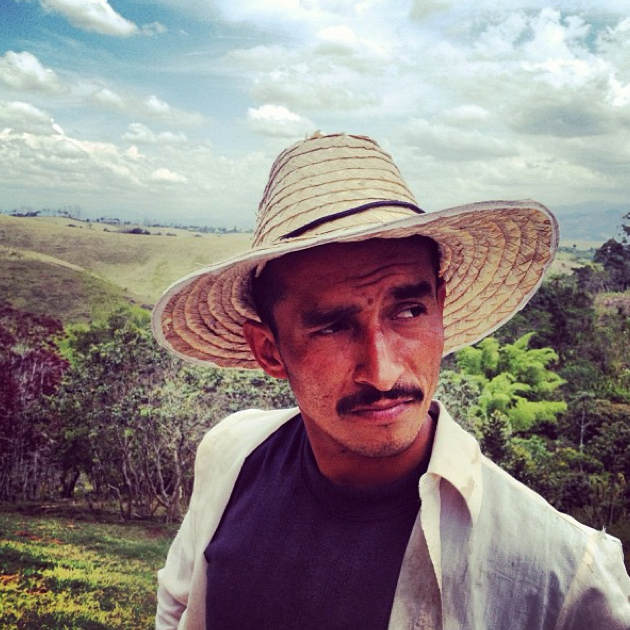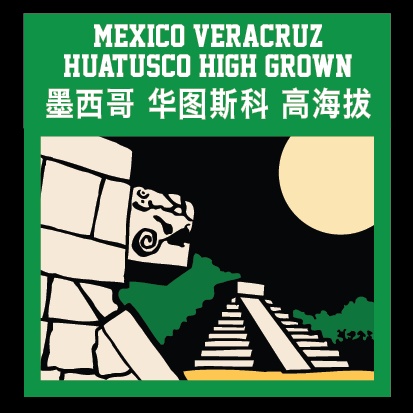-
Fair Trade Coffee in China——Why Now Is the Time to Start Drinking Fair Trade Coffee2014-04-15
Tag:Environment
Why Now Is the Time to Start Drinking Fair Trade Coffee
Kelsey Timmerman // Huffington Post

Jose Antonio Benevides
--4th generation Colombian coffee farmer, 1st generation FT farmer
Source: http://www.flickr.com/photos/fairtradecertified
Being a coffee farmer isn't easy.
This was one of the thoughts racing through my head as I straddled a shivering coffee tree on a steep, crumbly volcanic mountainside in Colombia's Narino district. However, mostly I was thinking: "Don't die! Don't die!"
The "grande gringo" as I became known to my coffee farmer hosts did not fall to his death, but, following my visit, coffee prices did.
In 2012, while I traveled to Honduras and Colombia researching my latest bookWhere Am I Eating? An Adventure Through the Global Food Economy, the global price for a pound of coffee beans stood at $1.60. By November of 2013, prices fell to$1.00 per pound -- a six-and-a-half year low.
When I read the reports of the low prices, I couldn't help but think of Felipe Ordonez, the Colombian farmer who allowed me to molest his trees. Felipe is a wiry man who bound up and down his sloped mountainside of coffee like a billy goat. Like other farmers around the world, Felipe was concerned about the changing climate. (On my global farming adventure, I met farmers on four continents and not a single one of them was a climate change denier.) His crop, facing wetter wet seasons and drier dry seasons, was threatened by coffee rust and beetles.
Coffee was how he fed his family. Coffee was how he sent his kids to school. Coffee was everything to Felipe.
For years Felipe has sold some of his coffee to Starbucks. His farm was included in Starbucks C.A.F.E. (Coffee and Farmer Equity Program) Practices certification program. (I found that many of the Starbucks farmers had never heard of the global coffee giant even though Starbucks included them in their C.A.F.E. Practices program as evidenced by the plaque affixed to their homes.) Felipe hoped to sell his coffee through an additional certification: fair trade. (Note: Starbucks reports that 90 percent of their coffee is ethically sourced through their C.A.F.E. Practices program and three percent from third-party certifiers such as Fairtrade International.)
Like other certifications, fair trade requires that a certain set of social and environmental standards be upheld. But fair trade farmers also earn a 20-cent social premium and an additional 30 cents per pound if their coffee is certified organic. And there's one other huge difference: Fair trade has a set minimum price, currently at $1.40 per pound, which protects farmers from falling prices.
When the global coffee price is above $1.40, the minimum is a non-factor, but when prices are much below, fair trade is even more appealing to farmers."Fair trade provides stability in the face of volatile markets, and farmers are recognizing this," explains Jenna Larson of Fair Trade USA. "We've heard from a number of co-ops that new farmers are joining to access better prices. GRAPOS in Chiapas, for example, reported that membership was up 24 percent in 2013."
When prices fall, so do the living standards of the farmers.
"This current market gives no hope for farmers to stay on their land, much less for the next generation to take over," said Angela Pelaez of Expocafe, a Colombian exporter that works with farmer cooperatives. "The average age of coffee farmers in Colombia is 56. Nobody wants to invest in a business that doesn't even meet the costs of production."
"Fairtrade generates a base price, which really helps us, especially in a time like now," stated Fatima Ismael, General Manager at Soppexcca, a cooperative in Nicaragua certified by Fairtrade International, in the certifier's October 2013 press release. "It gives us stability for our families."
Low prices coupled with a crop threatened by coffee rust is threatening the livelihoods of many farmers in Central America. In 2013, FUSADES, a think tank in El Salvador, predicted that 500,000 farm and processing jobs would be lost in Central America because of coffee rust. Farmers who are losing money on every sale, and are being pushed to a cliff in terms of their ability to invest in quality and productivity, are struggling to survive as coffee farmers.Maybe you want to look on the bright side of things and are thinking, "At least my morning cup of coffee will be getting cheaper."
Wrong.
Starbucks expects to see a positive impact on their bottom line of an extra $110 to $120 million this year, after seeing a $97 million benefit in 2013. It's unlikely they'll be passing much, if any, of the savings on to you.
Poorly compensated farmers are good for business. This is nothing new in the coffee industry. In The End of Food, author Paul Roberts reported that from 1997 to 2002, the price of coffee beans on the global market dropped 80 percent -- but the price to Starbucks' customers only dropped 27 percent.
In 1991, global coffee revenue equaled $30 billion. It's doubled to nearly $70 billion today. Yet in 1991, according to Antony Wild author of Coffee: A Dark History, producing countries earned 40 percent of the revenue. Today, as I document inWhere Am I Eating?, they're lucky to keep 10 percent.
We, as consumers, are paying more for coffee; producers are getting paid less; and those in the middle are making money from both.
Life for coffee farmers like my friend Felipe is already hard enough without facing collapses in the market. By starting every day with a cup of fair trade, organic coffee I'm drinking coffee for which the farmers earned nearly 90 cents more than a regular cup of coffee.
That's why drinking fair trade coffee is a simple act that makes a big difference.http://www.huffingtonpost.com/kelsey-timmerman/drinking-fair-trade-coffee_b_4646960.html
Fair Trade Success Story: Mexico
In 1992, after experiencing several unsuccessful government and development agency projects aimed at assisting coffee producers, a group of small-scale coffee farmers in Huatusco, Mexico decided to take responsibility for lifting their community out of the extreme poverty they faced. They formed the Unión Regional de Pequeños Productores de Café (Huatusco) with the goal of collectively finding new and better ways to cultivate and market their coffee. Thanks to its success in making a direct connection with specialty markets in the U.S. and Europe, the cooperative now has 1,908 small farmers among its members, including 600 women.Increased revenue from Fairtrade coffee sales has enabled the co-op to:•Establish education facilities in rural areas•Build regional healthcare centers for several villages•Expand their processing plant through the purchase of 12 de-pulping machines, two drying ovens, and several ventilators•Establish model gardens that teach members about the benefits of crop diversification•Fund a reforestation program, which includes training in shade tree cultivation and terracing to prevent erosion•Improve and expand its organic program to train 470 members in organic production techniques• Finance community development projects, including local road repairs
Follow us on WeChat: ALUOKE
关注我们的公众微信: 阿罗科咖啡

View (7263)

